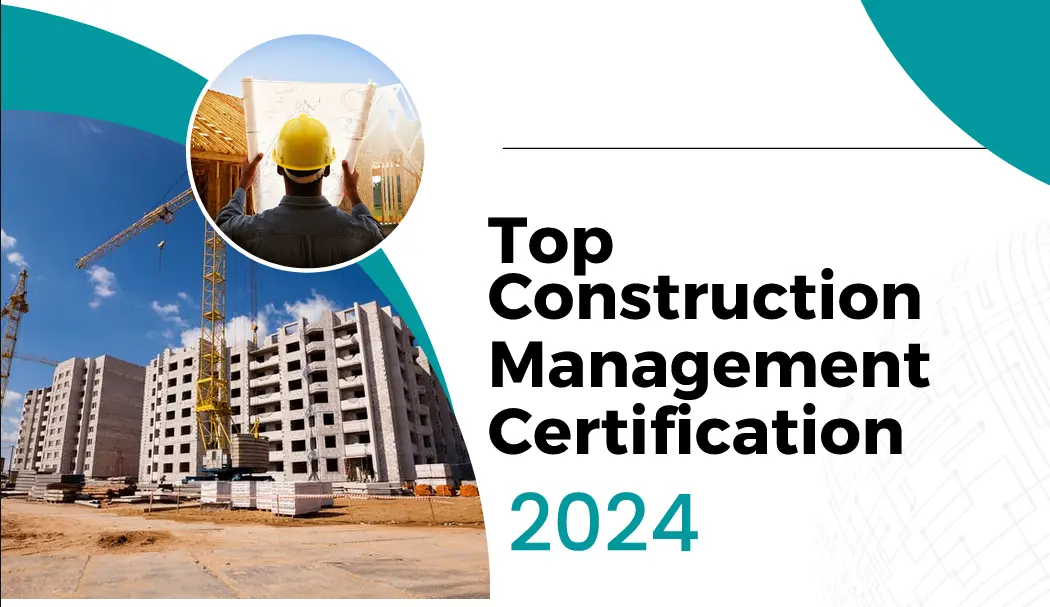Table of Contents
In the realm of construction management certification, individuals often seek clarity on the scope and depth of the curriculum. A construction project management certification is designed to equip professionals with the necessary skills and knowledge to navigate the complexities of construction projects efficiently. Covering a wide array of subjects, these certifications delve into various aspects crucial for effective project oversight and successful completion.
What are the different types of construction management certifications?
Construction manager certification programs come in various forms, catering to different career levels and specializations within the construction industry. From entry-level certificates to advanced credentials, options abound for aspiring construction professionals. Notable certification for construction project managers include Certified Construction Manager (CCM), Project Management Professional (PMP), OSHA 30 Construction Safety and Health Certification, LEED Green Associate, and Certified Associate in Project Management (CAPM). Each certification offers distinct advantages and focuses on different skill sets, allowing individuals to tailor their educational path to their career goals.
What is the difference between a certificate and a degree in construction management?
While both avenues offer valuable insights into construction management principles, the disparity lies in the depth and breadth of education. A degree in construction management typically entails a comprehensive curriculum covering various facets of the field, including engineering principles, project management techniques, and business acumen. On the other hand, a construction management certification program focuses on honing specific skills relevant to project management within the construction industry. Certificates provide targeted training in areas such as scheduling, cost estimation, and safety protocols, offering a more streamlined approach for individuals seeking specialized knowledge without committing to a full degree program. Both paths have their merits, and the choice ultimately depends on individual career aspirations and educational preferences.
Is a construction management certification right for me?
Determining whether a construction management certification aligns with one’s career goals requires careful consideration of various factors. These certifications are ideal for individuals already working in the construction industry who seek to enhance their skill set and advance their careers. They are also beneficial for recent graduates looking to break into the field or professionals transitioning from related industries. A certification for construction project manager can provide a competitive edge in a crowded job market by demonstrating expertise and commitment to professional development. However, it’s essential to assess one’s current skill level, career objectives, and willingness to invest time and resources into obtaining the certification before making a decision.
Top 5 construction management Certificates of 2024
In 2024, the top construction management certifications continue to pave the way for industry professionals to excel in their careers. These certifications are highly sought after for their comprehensive curriculum and industry recognition:
- Certified Construction Manager (CCM)
- Project Management Professional (PMP)
- OSHA 30 Construction Safety and Health Certification
- LEED Green Associate
- Certified Associate in Project Management (CAPM)
Each of these certifications equips individuals with the necessary skills and knowledge to thrive in the dynamic field of construction management, making them invaluable assets to aspiring and seasoned professionals alike.
How does a construction management certification cover project planning?
In a construction management certification program, project planning is a fundamental component extensively covered to ensure successful project execution. Students learn various methodologies and techniques for effective project planning, including defining project scope, setting objectives, creating schedules, and allocating resources. These programs emphasize the importance of thorough planning to mitigate risks, optimize workflows, and achieve project milestones efficiently. Additionally, students delve into advanced topics such as critical path analysis, resource leveling, and risk management to develop comprehensive project plans that address potential challenges proactively.
What aspects of cost management are covered in a construction certification?
Cost management is a critical aspect of construction projects, and construction management certification programs dedicate significant attention to this area. Participants learn various techniques for effective cost estimation, budget development, and cost control throughout the project lifecycle. Topics covered include resource cost analysis, budget forecasting, value engineering, and cost tracking methodologies. By understanding the intricacies of cost management, professionals can accurately assess project expenses, identify cost-saving opportunities, and optimize resource allocation to maximize project profitability.
When is scheduling covered in a construction management certification program?
Scheduling is a vital aspect of construction project management, and construction management certification programs typically address it comprehensively. Students learn how to develop and manage project schedules using industry-standard tools and techniques. They explore concepts such as critical path method (CPM), Gantt charts, and milestone tracking to effectively plan and monitor project timelines. Additionally, participants gain insights into strategies for optimizing schedules, managing dependencies, and mitigating scheduling conflicts to ensure timely project completion. By mastering scheduling principles, individuals can effectively coordinate resources, minimize delays, and maintain project momentum throughout the construction process.
What are the key safety topics covered in a construction management certification?
Safety is paramount in the construction industry, and construction management certification programs prioritize the integration of safety protocols and practices into their curriculum. Participants learn about various safety regulations, standards, and best practices aimed at creating a safe working environment on construction sites. Topics covered include hazard identification, risk assessment, personal protective equipment (PPE), and emergency response procedures. Additionally, students explore strategies for promoting a culture of safety within project teams and implementing proactive measures to prevent accidents and injuries. By prioritizing safety education, construction management certification programs empower professionals to prioritize the well-being of workers and stakeholders while ensuring compliance with industry regulations.
How does a construction management certification address quality control?
Quality control is essential for delivering construction projects that meet or exceed client expectations, and construction management certification programs emphasize its significance. Participants learn about quality management principles, methodologies, and tools for ensuring the consistency and reliability of project deliverables. They explore techniques such as quality planning, inspection and testing, and continuous improvement to monitor and enhance project quality throughout the construction process. Additionally, students gain insights into quality assurance processes, risk mitigation strategies, and stakeholder engagement techniques to foster a culture of quality excellence within project teams. By mastering quality control principles, individuals can uphold the reputation of their organizations and deliver projects that meet stringent quality standards and specifications.
Are sustainable construction practices included in a construction management certification?
Sustainability is a growing priority in the construction industry, and construction management certification programs incorporate sustainable practices into their curriculum. Participants learn about green building principles, energy-efficient design strategies, and sustainable construction materials and technologies. They explore topics such as LEED certification, life cycle assessment, and renewable energy integration to minimize environmental impact and maximize resource efficiency in construction projects. Additionally, students gain insights into sustainable procurement practices, waste management strategies, and environmental regulations to promote sustainable development practices throughout the project lifecycle. By embracing sustainable construction practices, professionals can contribute to environmental stewardship and create buildings that are healthier, more energy-efficient, and more resilient to climate change.
What types of questions are on a construction management certification exam?
Construction management certification exams typically cover a wide range of topics related to project management, construction techniques, and industry best practices. Sample questions may include scenario-based inquiries, multiple-choice questions, and essay questions designed to assess candidates’ understanding of key concepts and their ability to apply them in real-world situations. Topics covered may include project planning, scheduling, cost management, quality control, safety regulations, contract management, and stakeholder communication. Additionally, exams may test candidates’ knowledge of relevant laws, regulations, and industry standards applicable to construction projects.
By preparing thoroughly and familiarizing themselves with the exam format and content, candidates By preparing thoroughly and familiarizing themselves with the exam format and content, candidates can increase their chances of success in obtaining construction management certification. Many certification programs offer study guides, practice exams, and review courses to help candidates prepare effectively. Additionally, hands-on experience in construction project management and participation in continuing education programs can further enhance candidates’ readiness for certification exams.
Overall, certification exams serve as a benchmark for assessing candidates’ knowledge, skills, and competency in construction management, validating their expertise and credibility within the industry.
How many domains are typically covered in a construction management certification exam?
Construction management certification exams typically cover multiple domains or knowledge areas relevant to the field. These domains may include project planning, scheduling, cost management, quality control, safety regulations, contract administration, and stakeholder communication. Each domain encompasses specific competencies and skills essential for effective construction project management. By covering a broad range of topics, certification exams ensure that candidates possess a comprehensive understanding of the various facets of construction management and are well-equipped to tackle the challenges encountered in their roles.
Is there a practical component to a construction management certification exam?
While the format of construction management certification exams may vary depending on the certifying body, some programs include a practical component to assess candidates’ ability to apply theoretical knowledge in real-world scenarios. This practical component may involve case studies, simulations, or hands-on exercises designed to evaluate candidates’ problem-solving skills, decision-making abilities, and project management acumen. By incorporating a practical component into the exam, certifying bodies can ensure that certified professionals possess not only theoretical knowledge but also the practical skills necessary to excel in construction management roles.
What are the benefits of having a construction management certification?
Earning a construction management certification offers numerous benefits for professionals in the construction industry. Firstly, certification validates one’s expertise and competency in construction project management, enhancing credibility and marketability in the job market. Certified professionals often command higher salaries and are sought after by employers seeking skilled and qualified individuals to lead their construction projects. Additionally, certification provides opportunities for career advancement and professional growth, opening doors to leadership roles and higher-level positions within organizations. Furthermore, certification demonstrates a commitment to ongoing learning and professional development, signaling to employers and clients alike that the certified professional is dedicated to staying current with industry trends and best practices.
Am I more qualified for construction jobs with a certification?
While certification is not always a prerequisite for employment in the construction industry, it can significantly enhance one’s qualifications and competitiveness in the job market. Employers often prefer candidates with construction management certification as it serves as tangible evidence of their knowledge, skills, and expertise in the field. Certified professionals are viewed as more competent and capable of effectively managing construction projects, thereby increasing their chances of securing desirable job opportunities and advancement within their careers. Additionally, certification may provide a competitive edge over non-certified candidates, especially in industries where certification is highly valued and sought after.
How can a construction management certification help me advance my career?
Earning a construction management certification can propel your career to new heights by opening doors to a myriad of opportunities for advancement and professional growth. Certified professionals are often considered for leadership roles such as project manager, construction manager, or site supervisor, where they can take on greater responsibilities and oversee larger projects. Additionally, certification may lead to increased visibility and recognition within the industry, as certified professionals are often sought after for their expertise and credibility. Furthermore, certification demonstrates a commitment to excellence and ongoing learning, qualities that are highly valued by employers seeking top talent in the construction field.
What are the eligibility requirements for a construction management certification?
Eligibility requirements for construction management certification programs vary depending on the certifying body and the specific certification being pursued. However, common requirements may include a minimum level of education (such as a high school diploma or equivalent), a certain number of years of experience in the construction industry, completion of specific coursework or training programs, and passing a certification exam. Some certifications may also have additional requirements, such as professional references or letters of recommendation. It’s essential to review the eligibility criteria for the certification program you’re interested in to ensure that you meet all requirements before applying.
How much experience do I need to qualify for a construction management certification?
The amount of experience required to qualify for a construction management certification varies depending on the certifying body and the specific certification being pursued. Entry-level certifications may require less experience, while advanced certifications may have more stringent requirements. Typically, candidates are expected to have a minimum of several years of experience working in the construction industry, with increasing levels of responsibility and leadership roles preferred. Some certifications may also accept a combination of education and experience in lieu of a certain number of years of work experience. It’s essential to review the experience requirements for the certification program you’re interested in and ensure that you meet the minimum qualifications before applying.
What steps are involved in obtaining a construction management certification?
The process of obtaining a construction management certification typically involves several steps, including:
- Research: Begin by researching different certification programs available and identifying the one that best aligns with your career goals and aspirations.
- Eligibility Check: Review the eligibility requirements for the certification program to ensure that you meet all prerequisites before applying.
- Preparation: Prepare for the certification exam by studying relevant materials, attending review courses or workshops, and taking practice exams to familiarize yourself with the exam format and content.
- Application: Complete the application process for the certification program, which may involve submitting transcripts, work experience documentation, and payment of application fees.
- Exam: Schedule and sit for the certification exam, ensuring that you are well-prepared and confident on the day of the test.
- Passing: Upon passing the exam, you will receive your construction management certification, validating your expertise and competency in the field.
- Continuing Education: Some certifications may require ongoing education or professional development to maintain certification status. Be sure to fulfill any continuing education requirements to keep your certification current.
By following these steps diligently and staying committed to your professional development, you can obtain a construction management certification and take your career to new heights in the construction industry.
Are there ongoing education requirements for maintaining a construction management certification?
Many construction management certification programs require certified professionals to participate in ongoing education or professional development activities to maintain their certification status. These requirements ensure that certified professionals stay current with industry trends, best practices, and emerging technologies in the field of construction management. Continuing education activities may include attending seminars, workshops, conferences, or completing additional coursework related to construction project management. By participating in ongoing education, certified professionals can enhance their knowledge and skills, stay competitive in the job market, and maintain their certification credentials.
How much does it typically cost to get a construction management certification?
The cost of obtaining a construction management certification can vary depending on several factors, including the certifying body, the specific certification being pursued, and any additional expenses such as study materials or exam preparation courses. Generally, certification exam fees range from a few hundred to several thousand dollars, depending on the complexity and prestige of the certification program. In addition to exam fees, candidates may incur costs for study materials, review courses, and travel expenses associated with taking the exam. It’s essential to budget accordingly and consider the return on investment in terms of career advancement and earning potential that comes with obtaining a construction management certification.
In conclusion, obtaining a construction management certification can be a pivotal step towards advancing one’s career in the construction industry. These certifications offer a comprehensive curriculum covering essential aspects such as project planning, cost management, scheduling, safety, quality control, and sustainability. By earning a certification, professionals demonstrate their expertise, enhance their credibility, and increase their marketability in a competitive job market. Whether you’re a seasoned construction professional looking to bolster your skill set or a recent graduate aiming to break into the field, a construction management certification can provide the knowledge and credentials needed to excel in various roles within the industry.
To read more insightful articles and explore further opportunities for professional development, visit Jointhegrave.com.














Leave a Reply